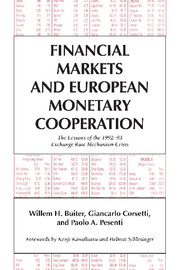 Financial Markets and European Monetary Cooperation
Financial Markets and European Monetary Cooperation Published online by Cambridge University Press: 06 July 2010
Toward the crisis
German reunification
German reunification was an unprecedented economic and political event: the integration of two national economies that had undergone postwar reconstruction under two very different systems, ending up with a substantial gap in productive capacities and standards of living. It would have been a difficult enterprise at the best of times. It was turned into a textbook example of macroeconomic mismanagement, eventually resulting in the adoption of a monetary–fiscal policy mix that was undesirable even for Germany internally, let alone for the EC as a whole.
First, the German Chancellor kept his electoral promise not to finance the massive transfer of resources to the Eastern part of the country by asking Western Germans to pay additional taxes. Nor were there significant cuts in other spending items in the budget. In 1991, the net transfer of West German public funds to East Germany was as high as 139 billion D-mark. To get a sense of this magnitude, it can be compared to West German private saving for that year of 260 billion D-mark. This net transfer reached 180 billion D-mark the following year. The rate of growth of West German public sector indebtedness, which averaged around 5% in the second half of the Eighties, rose to 13.4% and 11.2% in 1990 and 1991, respectively.
Second, with the creation of a Monetary, Economic, and Social Union in May 1990, GDR marks could be converted into D-mark on a 1:1 or 2:1 basis.
To save this book to your Kindle, first ensure [email protected] is added to your Approved Personal Document E-mail List under your Personal Document Settings on the Manage Your Content and Devices page of your Amazon account. Then enter the ‘name’ part of your Kindle email address below. Find out more about saving to your Kindle.
Note you can select to save to either the @free.kindle.com or @kindle.com variations. ‘@free.kindle.com’ emails are free but can only be saved to your device when it is connected to wi-fi. ‘@kindle.com’ emails can be delivered even when you are not connected to wi-fi, but note that service fees apply.
Find out more about the Kindle Personal Document Service.
To save content items to your account, please confirm that you agree to abide by our usage policies. If this is the first time you use this feature, you will be asked to authorise Cambridge Core to connect with your account. Find out more about saving content to Dropbox.
To save content items to your account, please confirm that you agree to abide by our usage policies. If this is the first time you use this feature, you will be asked to authorise Cambridge Core to connect with your account. Find out more about saving content to Google Drive.